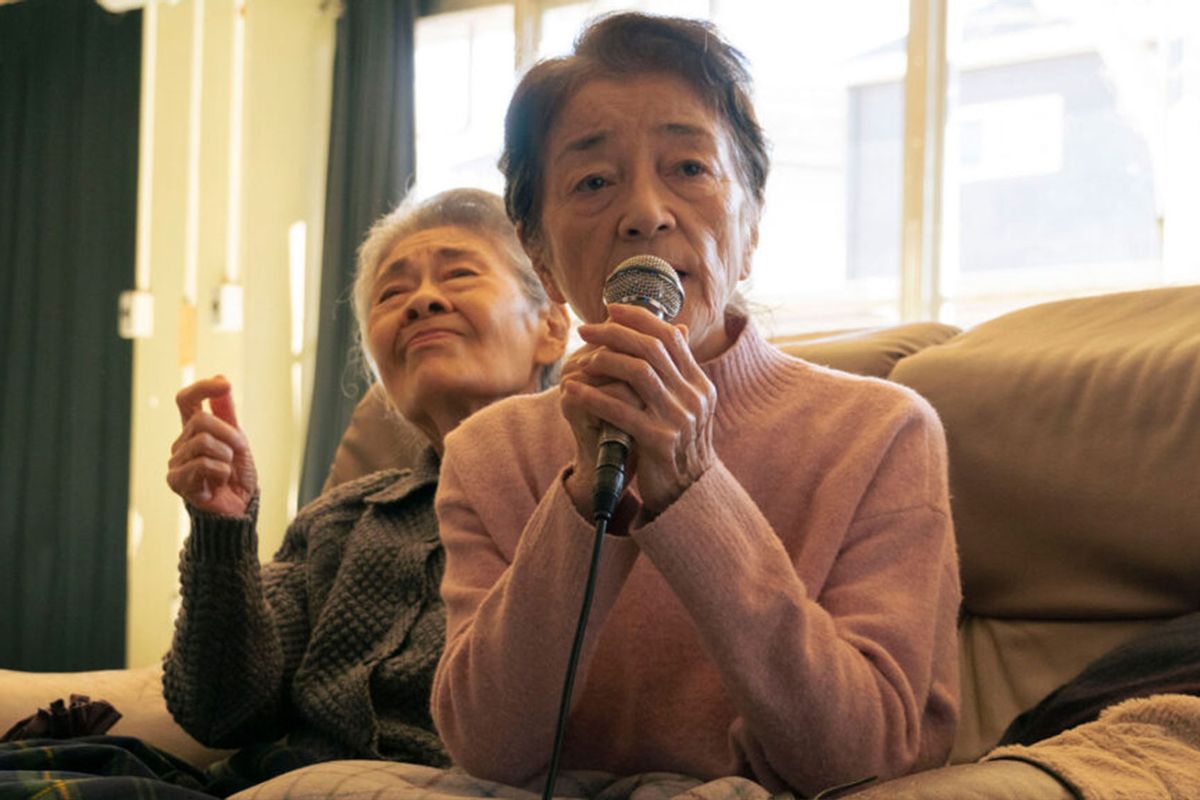"Plan 75," which won a top prize at Cannes, and was Japan's Oscar submission last year, sensitively addresses the topic of euthanasia. In her feature film debut, writer/director Chie Hayakawa expanded her short film about a future government policy that encourages folks over the age of 75 to choose the date of their own death — with cash payments provided as incentives.
"People often talk about the value of life based on one's productivity ... The real trigger was my anger towards intolerant society."
Hayakawa's film is, of course, critical of Plan 75 in that the 78-year-old Michi (Chieko Baisho) does not want to die. This former hotel employee considers the option only because she has a lack of job opportunities, an inability to secure housing and no family to care for her. In contrast, Yukio (Taka Takao) willingly enlists. However, the man processing his application is Hiromu (Hayato Isomura), his nephew, and a salesman for Plan 75. Hiromu is reluctant to have his uncle participate. Rounding out the cast is Maria (Stefanie Arianne), a Filipino woman who is working in Japan to raise money for her 5-year-old daughter who has a heart condition. Maria gets a job working for Plan 75 because she hears it pays good money.
"Plan 75" uses these characters and their storylines to consider how we care for and value the elderly. There are many touching scenes of Michi trying to find a connection to ease her loneliness, or Hiromu making peace with his uncle after years apart.
Hayakawa spoke with Salon about her new film and the issue of euthanasia.
You open the film with a character dying by suicide hoping, "his courageous act triggers a discussion and a future that is brighter." Is that the purpose of your film — to create discussion or debate on this issue? Japan has no official laws about euthanasia.
I used that opening segment because the character's statement was not to open discussion; it shows what he does and what Plan 75 does, are the basically the same thing. In Plan 75, [suicide] looks nice and friendly and easy to use, and the [opening character's] suicide is so brutal and bloody and cruel.
The way you depict death in the film is not bloody, but it has a violence to it. I understand you were inspired to make this film after hearing a 2016 news report of a man who killed 19 disabled people and injured more than two dozen others to "relieve society of the burden." What prompted you to approach this topic the way you did? In America, we would have made a film about that attack.
I was so shocked by that incident. But it's not an incident caused by just one crazy person, but it happened because of social factors — an extreme rationalism that we have in society. People often talk about the value of life based on one's productivity. I have heard many discriminatory comments by celebrity influencers and politicians on the elderly, disabled and the poor. I sense a more intolerant atmosphere is society. Although that incident triggered me to make this film, I wanted a broader meaning. The real trigger was my anger towards intolerant society. I wasn't interested in depicting that massacre, but I thought a lot of people may have the same feeling as that killer if they think the value of life is productivity.
 Plan 75 (KimStim)
Plan 75 (KimStim)
How did you conceive of the three main characters, Michi, Hiromu, and Maria, and tell their individual stories?
I decided not to show the faces of people who created the system. I wanted to depict the people who use the system and who work for the system. I wanted to depict the system itself instead of what kind of people who make this plan or the thoughts of the people who conceived of this plan.
The reason I created Maria was to have a point of view of a foreigner who looks at Japanese society from the outside. Filipino people have a very strong bond with family and community, which I think Japan is losing. I wanted to show that contrast between Japanese and Filipino characteristics. For Filipinos, it is common if they find someone struggling, they go and help them. But Japanese people tend to keep a distance and are hesitant to ask for help.
Your film is positioned to endorse Plan 75 for folks, like Yukio, who want to die, but also force people like Michi to consider it because she has no other options. Can you talk about this?
"We don't have Plan 75 in our society, but the government's attitudes towards the socially weak is happening. "
As you can tell, the film is not about pro or con for euthanasia. It was not my intention to judge how people should die or how people think about dying. I try not to show judgment when I depict Plan 75. I feel very critical towards empathy and indifference for socially weak people. [e.g., the poor and disabled] If you are rich and have an option to live or die it will be OK, because Plan 75 is not mandatory, or a forced choice. But there are people who have no choice but Plan 75. The reason why the government created this system was to get rid of people they have to spend money on to take care of them. It's clear, but it is covered up by a commercial campaign which looks nice and friendly, but is very eerie. We don't have Plan 75 in our society, but the government's attitudes towards the socially weak is happening.
"Plan 75" considers the value of the elderly as disposable. What observations do you have on the surplus of seniors in Japan and their "burden" on society. How should the government handle this? You mentioned the socially weak.
In Japan, the government tends to be more supportive of the elderly. The group of senior citizens is the biggest source of the vote in an election. That's why politicians try to make friendly policies towards senior citizens. And it is one of the reasons why other generations' hostility to the elderly is growing. What I say about the government's carelessness to the socially weak is more to the poor and disabled people who are on social welfare. They will try not to help them and say, "You should take care of yourself because we're not going to be able to help you anymore." The government tries to shift the attitude and put all the responsibility to each citizen.
The film's imagery conveys a sense of the isolation and loneliness of the characters. Can you discuss your visual approach to telling the story?
I like to depict the detail of Michi's life, especially when she is alone in her apartment. She is lonely, but she is not crying. She is a strong woman who lives alone and supports herself. We gradually learn what she is missing after she loses her job and her close friends, is a human connection. That's why she wants to keep living. She doesn't look so lonely when she is enjoying her life by herself, but as she starts losing a place to live and work, we find her loneliness in that small apartment. I try to capture her in a medium frame but towards the end, I made her smaller and smaller in the frame to create isolation visually.
Maria is shot with a handheld. She is a symbol of life. She is the character who acts on her own thought and belief. All the Japanese characters act and behave on social pressures and what others think. They try to read atmosphere. What they do is not based on their instinct or beliefs.
Want a daily wrap-up of all the news and commentary Salon has to offer? Subscribe to our morning newsletter, Crash Course.
Your film, which is based on short you made, won a top prize at Cannes and was Japan's Oscar submission last year. What can you say about developing the features and the visibility this has given you as a filmmaker?
It's amazing. A year ago, I had not completed the film. I couldn't imagine what has happened with it. This success makes it easier for me to make the film, which is great. It will be easier for me to get financing and find actors. Back then I was a first-time director, and no one knew me. People thought it was risky to invest in a first-time director with an original story. It took so many years to get it done.
"Other generations' hostility to the elderly is growing."
I had the concept of "Plan 75" as a feature in 2017, but I didn't know any producers I could work with. I had only made independent student short films. I got a call from a producer I met in Cannes, and she asked me to work on "10 Years Japan," a project executive produced by Kore-eda. It asked directors to submit a project about any social issue-related topic in Japan after 10 years, I decided to make the short first. It was my first opportunity to work with professional staff. I was selected for the project. The producer and I decided to make the feature version together because we believed in the story and thought it should be a feature. Making the short film first was a good experience for me. I could see what worked and what was not working. The shorter version was good to have to pitch my feature to investors and partner countries to do the co-production.
Can you express your personal opinion on euthanasia? Even if you may not choose this for yourself or a loved one, shouldn't people have the right to end their own lives if they want to?
That's a very difficult question. I am not sure I should discuss it. I feel compassion for people who choose death with dignity, but at the same time, I have concerns and doubts about the government controlling the life and death of people. I can't say yes or no. I'm in the very gray area. But I am hesitant about it and against making it the law.
"Plan 75" opens April 21 in New York (with filmmaker Q&As April 21-23) and May 5 in Los Angeles with a N. America release to follow.
Read more
movie interviews by Gary Kramer



Shares